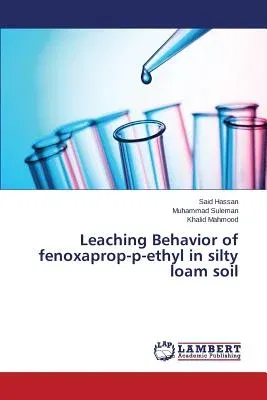Hassan Said
(Author)Leaching Behavior of fenoxaprop-p-ethyl in silty loam soilPaperback, 25 August 2015

Qty
1
Turbo
Ships in 2 - 3 days
In Stock
Free Delivery
Cash on Delivery
15 Days
Free Returns
Secure Checkout
Print Length
52 pages
Language
English
Publisher
LAP Lambert Academic Publishing
Date Published
25 Aug 2015
ISBN-10
3659749664
ISBN-13
9783659749667
Description
Product Details
Book Format:
Paperback
Country of Origin:
US
Date Published:
25 August 2015
Dimensions:
22.86 x
15.24 x
0.3 cm
ISBN-10:
3659749664
ISBN-13:
9783659749667
Language:
English
Pages:
52
Publisher:
Weight:
90.72 gm

